Summary
This guide will explore the top alternatives for 2025, assisting businesses in finding a solution that aligns with their operational structure and scalability requirements. Before choosing a tool, it is essential to define your business requirements across key areas like CRM, project management, and inventory.
Why Look for Odoo Alternatives?
Odoo's all-in-one nature and significant flexibility can also be a source of complexity, particularly for small and medium-sized enterprises (SMEs) that prioritize simplicity. Businesses often seek alternatives for several common reasons.
- Implementation Complexity: Odoo can be challenging to set up and customize without dedicated technical expertise.
- Cost: Although the community version is available for free, the enterprise version, along with hosting and support, can become a considerable expense.
- Specific Needs: Some businesses may require more specialized functionality in a single area, such as advanced financials, which a niche competitor might offer more effectively.
- User Interface: Certain teams may prefer a more modern or intuitive user interface than what Odoo provides.
You can learn more about these considerations by reviewing 10 alternatives to Odoo and their unique value propositions.
Key Features to Consider When Choosing an Odoo Alternative
Evaluating key features is a crucial step to ensure the selected solution meets your company's unique operational needs.
Core Functionality
An effective alternative should offer essential modules that are well-integrated to provide a unified view of business operations. These include:
- Financial management
- Inventory management
- Human resources
- Project management
- Customer Relationship Management (CRM)
Integration Capabilities
Seamless integration with other business tools, such as e-commerce platforms, payment gateways, and marketing automation software, is critical. A solution must connect easily to your existing technology stack. For instance, incorporating an advanced communication platform like Ringover can unify interaction data within your primary business management software, streamlining workflows.
Customization and Scalability
The software must be flexible enough to adapt to your unique business processes. The solution should also be scalable, capable of growing with your company without imposing significant limitations on users or data. This is particularly important for midsize companies with ambitious growth plans [1].
User Experience and Support
The user interface ought to be intuitive and easy for non-technical users to navigate. For successful adoption, reliable customer support, comprehensive documentation, and available training resources are also necessary.
Analytics and Reporting
Advanced reporting and analytics capabilities are vital for making data-driven decisions. Look for features such as real-time dashboards, customizable reports, and business intelligence tools to gain clear performance insights [2].
Table: Best Odoo Alternatives at a Glance
| Software Name | Best For | Description |
|---|---|---|
| Oracle NetSuite | Medium & Large Businesses | A comprehensive cloud ERP for finance, HR, and e-commerce. |
| SAP Business One | SMEs & Subsidiaries | An integrated ERP covering accounting, production, and CRM. |
| Microsoft Dynamics 365 | Businesses in the Microsoft Ecosystem | A solution merging ERP and CRM with deep Office 365 integration. |
| ERPNext | SMEs & Startups | An open-source ERP with modules for finance, HR, and manufacturing. |
| Dolibarr | Small Businesses & Freelancers | A modern, open-source ERP/CRM for invoicing, inventory, and marketing. |
| Sage Intacct | Finance-focused Businesses | A cloud financial management solution with strong accounting features. |
First, identify your key needs (CRM, ERP, inventory management, etc.) and constraints (budget, ease of integration, scalability) to make the best choice.
Top 10 Odoo Alternatives (In-Depth Reviews)
1. Oracle NetSuite
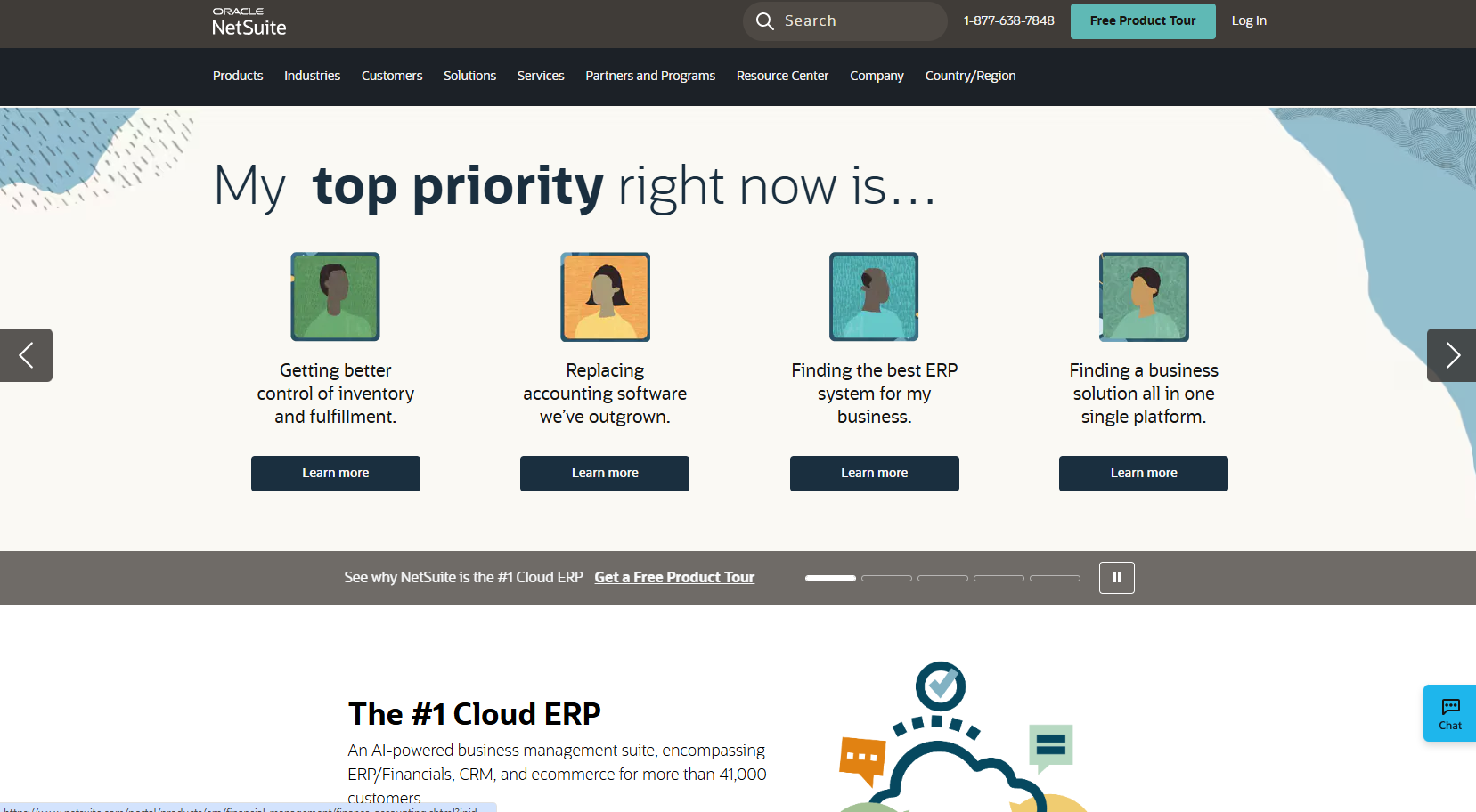
Oracle NetSuite is a comprehensive cloud-based ERP solution designed to meet the needs of medium and large businesses, with a massive customer base across more than 200 countries.
It offers a wide range of applications covering financial management, human resources, marketing automation, and omnichannel commerce.
NetSuite stands out for its advanced features in production management, logistics, customer relations, and its analytics and reporting tools that enhance business intelligence.
2. SAP Business One
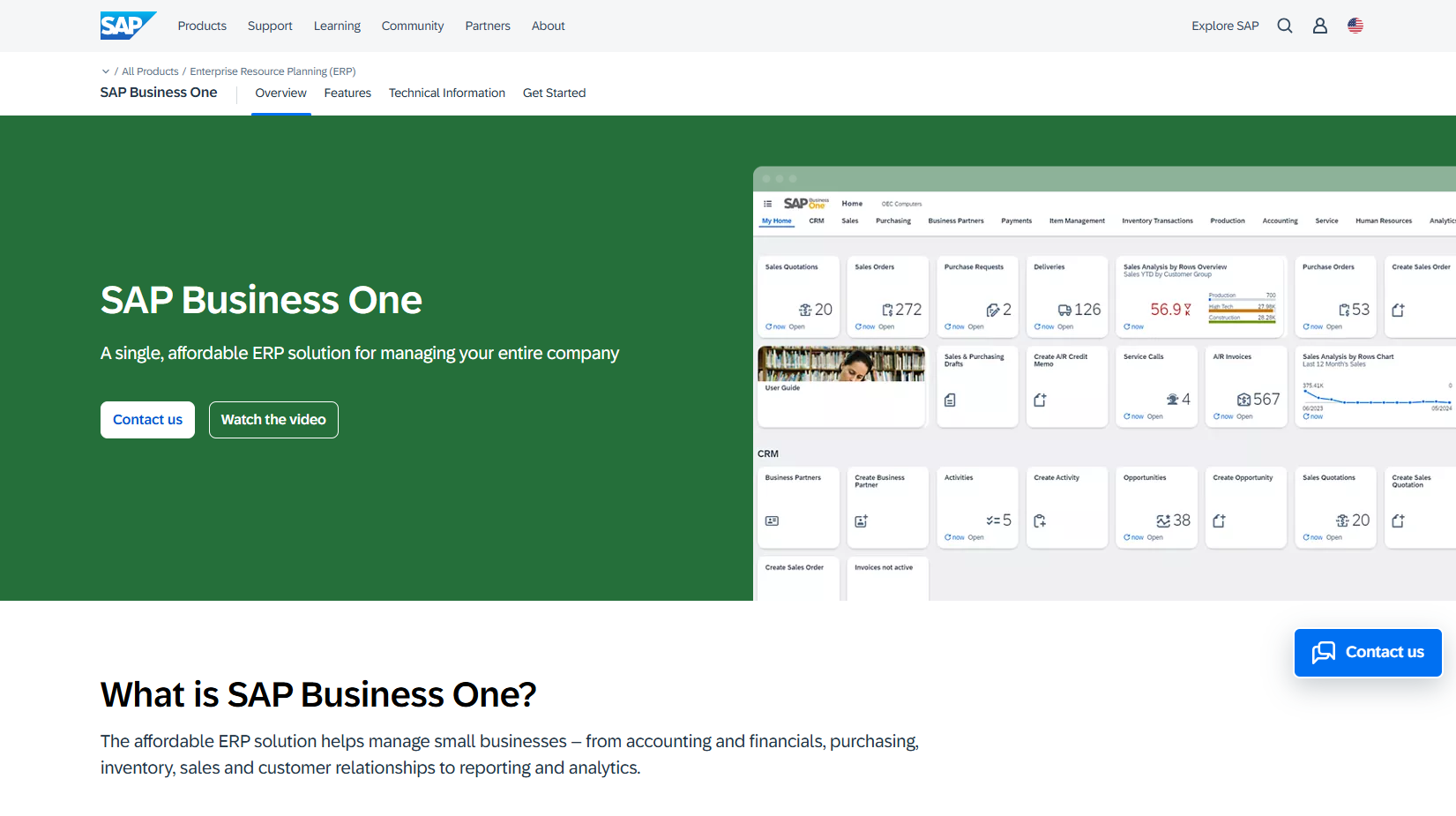
SAP Business One is an ERP specifically designed for small and medium-sized enterprises (SMEs) as well as subsidiaries of large corporations.
It ensures full integration of business processes, from accounting and financial reporting to procurement, production, sales, and customer relations.
Available as both a cloud or on-premise deployment, SAP Business One can also be integrated with SAP HANA and Microsoft 365.
3. Microsoft Dynamics 365
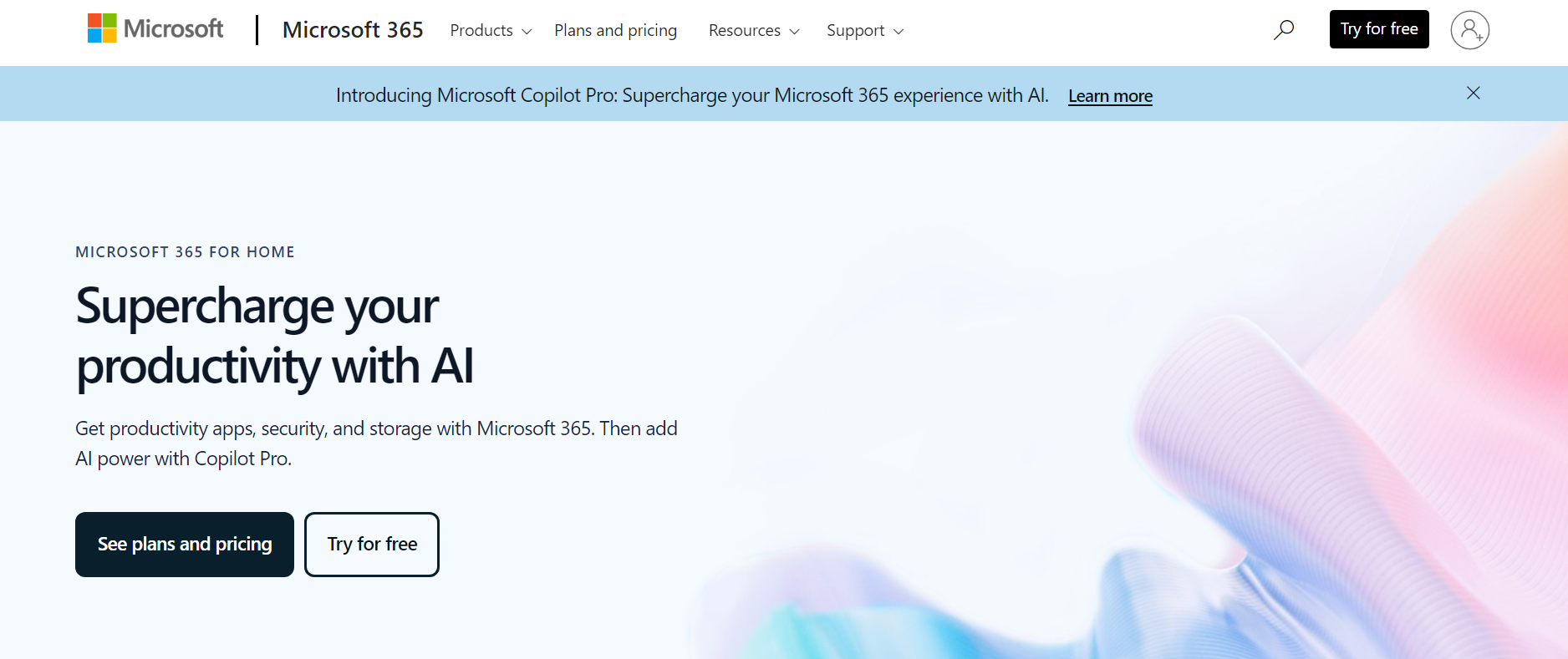
Microsoft Dynamics 365 Business Central offers a comprehensive business management solution, merging financial management, supply chains, invoicing, analytics, and customer relationship management.
As the successor to Microsoft Dynamics NAV, this modernized solution allows unlimited scalability in terms of the number of users and seamlessly integrates with other Microsoft applications as well as third-party add-ons.
4. BoondManager
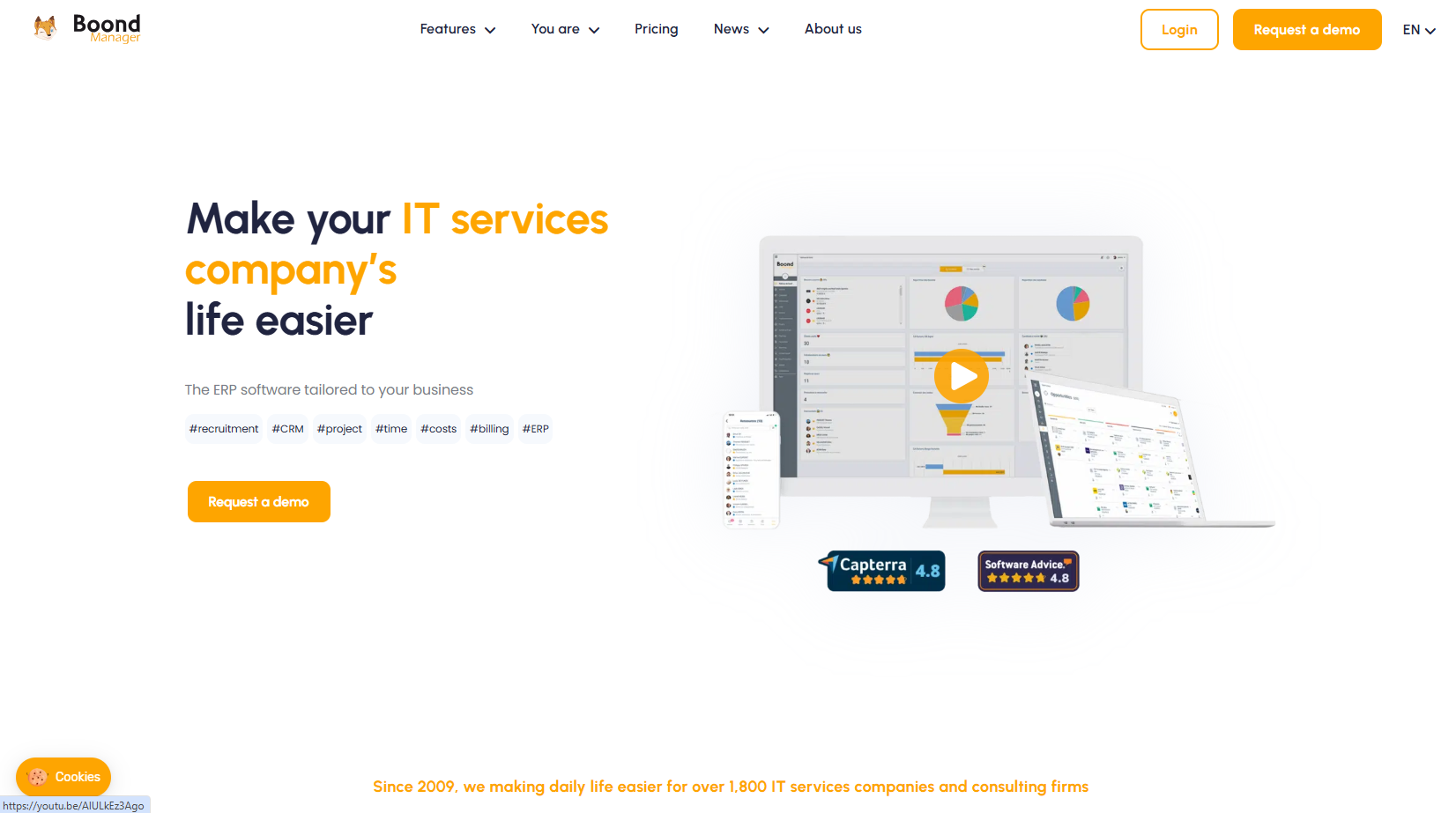
BoondManager is an ERP software designed to meet the needs of service-based companies, particularly in consulting, engineering, and IT services firms (ESNs – Digital Service Companies).
This tool centralizes and optimizes the management of key activities, such as sales management, project tracking, resource planning, invoicing, and reporting.
Its modular platform adapts to industry-specific requirements to enhance productivity and promote better team coordination.
Accessible in SaaS mode, BoondManager also offers collaborative features and integrations with other tools to simplify operational processes.
5. Sage
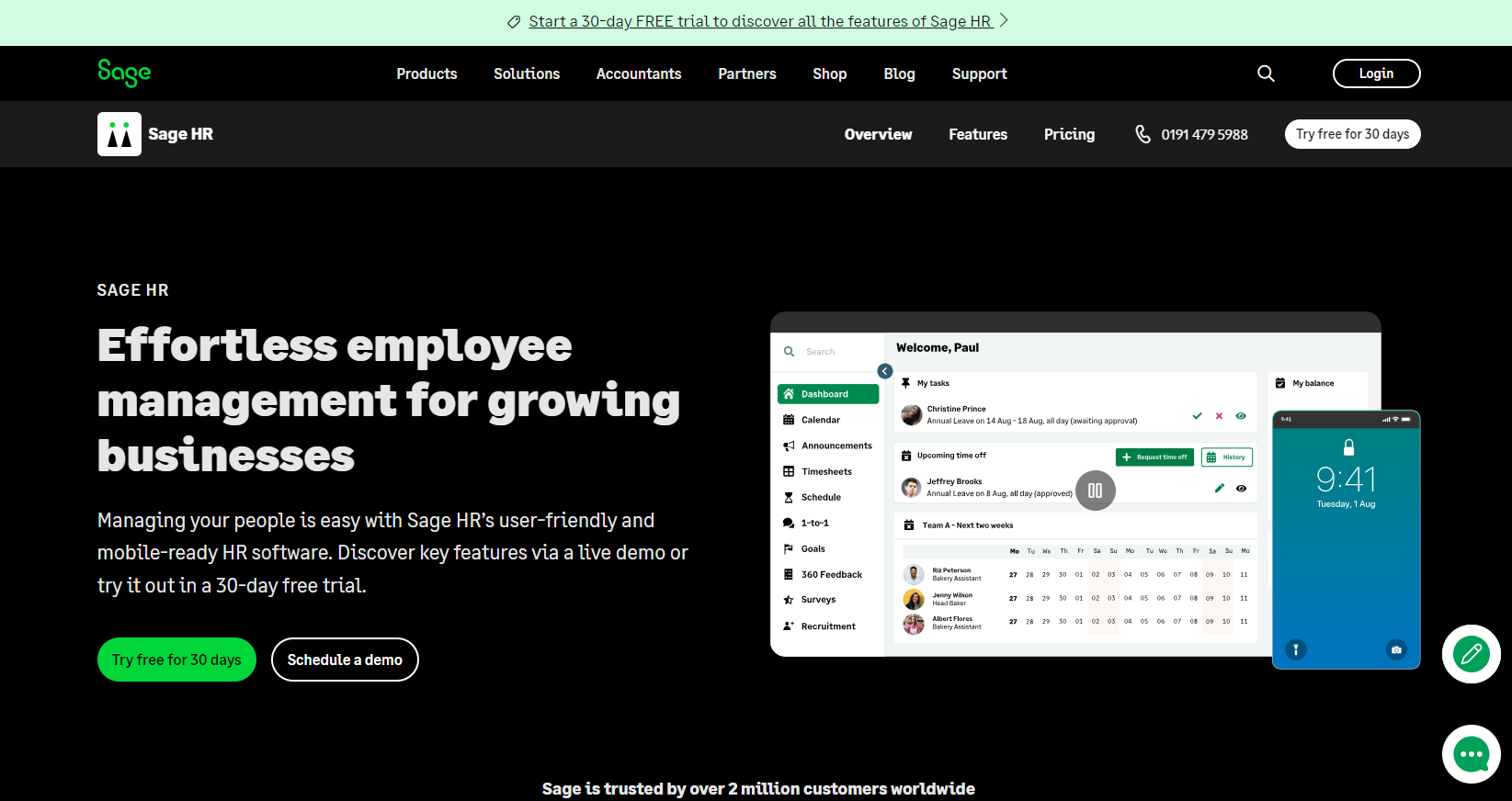
Sage X3, including its Sage Intacct version, is an ERP solution focused on financial management, accounting, and planning. It is ideal for mid-sized businesses, offering features to enhance production, inventory management, and logistics.
Sage is particularly valued for its advanced reporting and financial analysis tools.
6. ERPNext
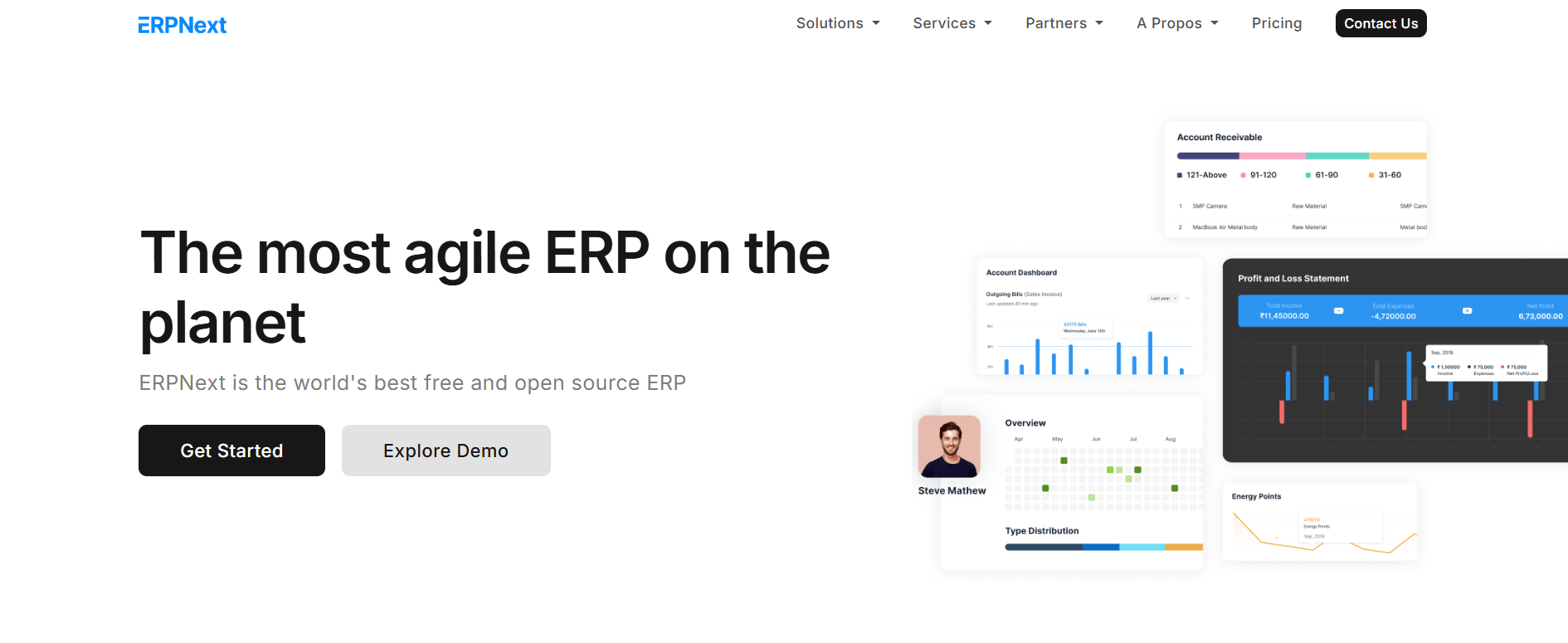
ERPNext is a comprehensive open-source ERP solution covering a wide range of functionalities, from financial management and human resources to inventory and project management.
Suitable for businesses of all sizes, it stands out for being free and customizable for various industries such as services, retail, and healthcare.
ERPNext offers customizable dashboards, lead management, sales and marketing campaigns, and efficient tools for supply chain management.
7. Dolibarr
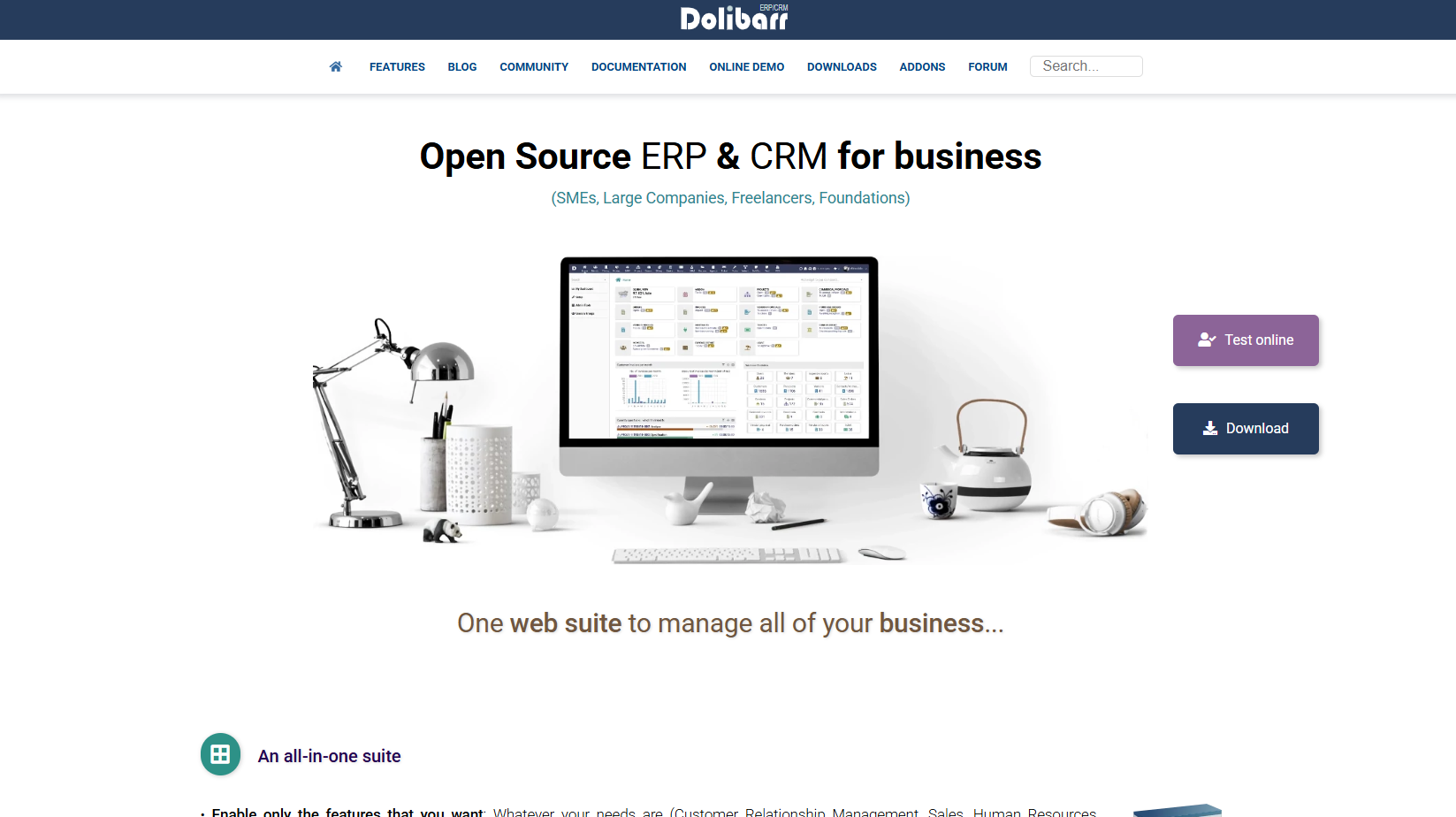
Dolibarr is an open-source ERP and CRM software known for its modernity and ease of use. It allows the management of customers, invoices, orders, products, inventory, schedules, email campaigns, and shipments.
Compatible with Windows, Mac, Linux, and Android, Dolibarr is particularly suited for small and medium-sized businesses due to its high flexibility.
8.Divalto
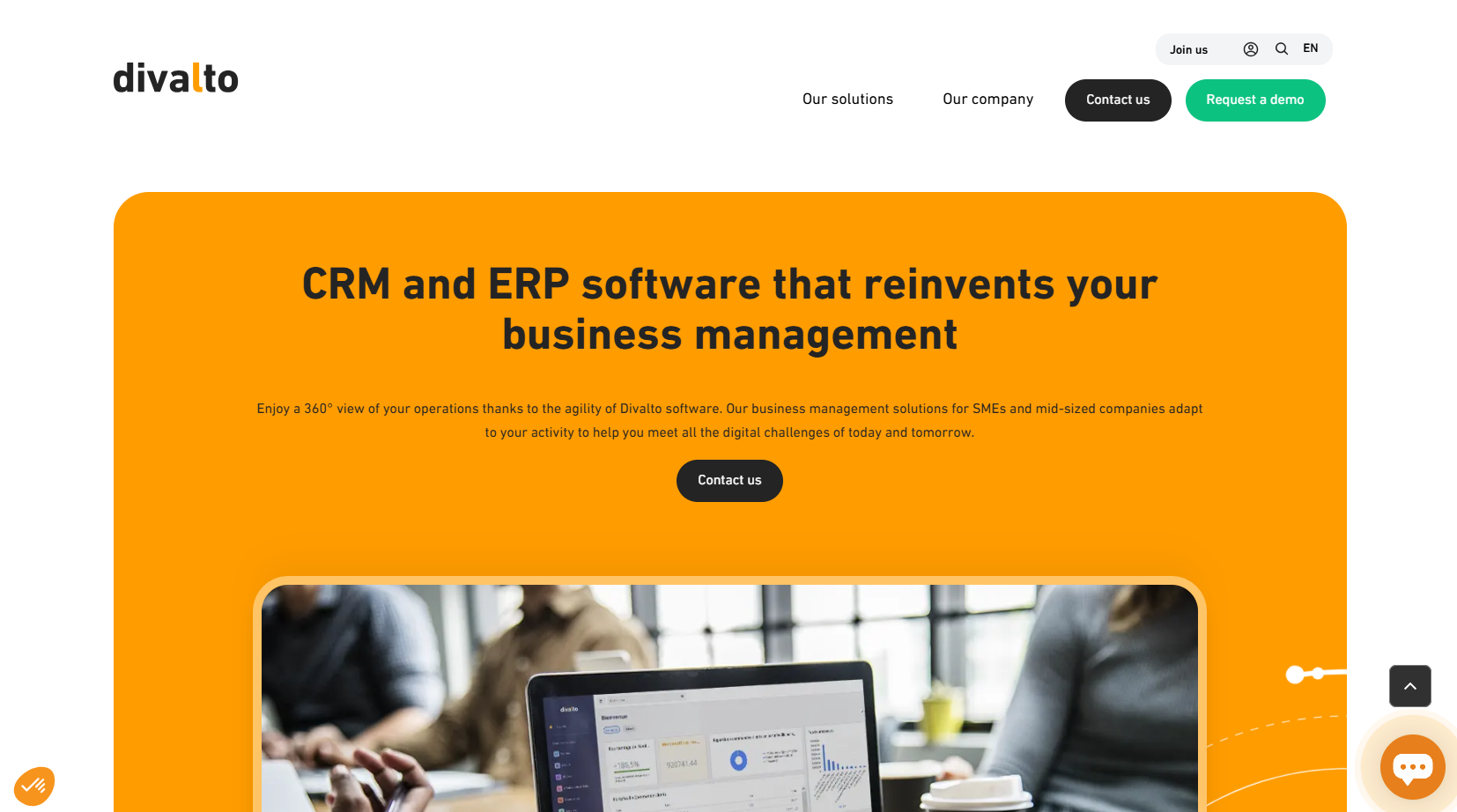
Divalto is a French ERP solution focused on integrated business management, covering financial management, inventory, production, and customer relations. Designed for SMEs and mid-sized companies, it aims to optimize operational processes and improve efficiency.
9. Sylob
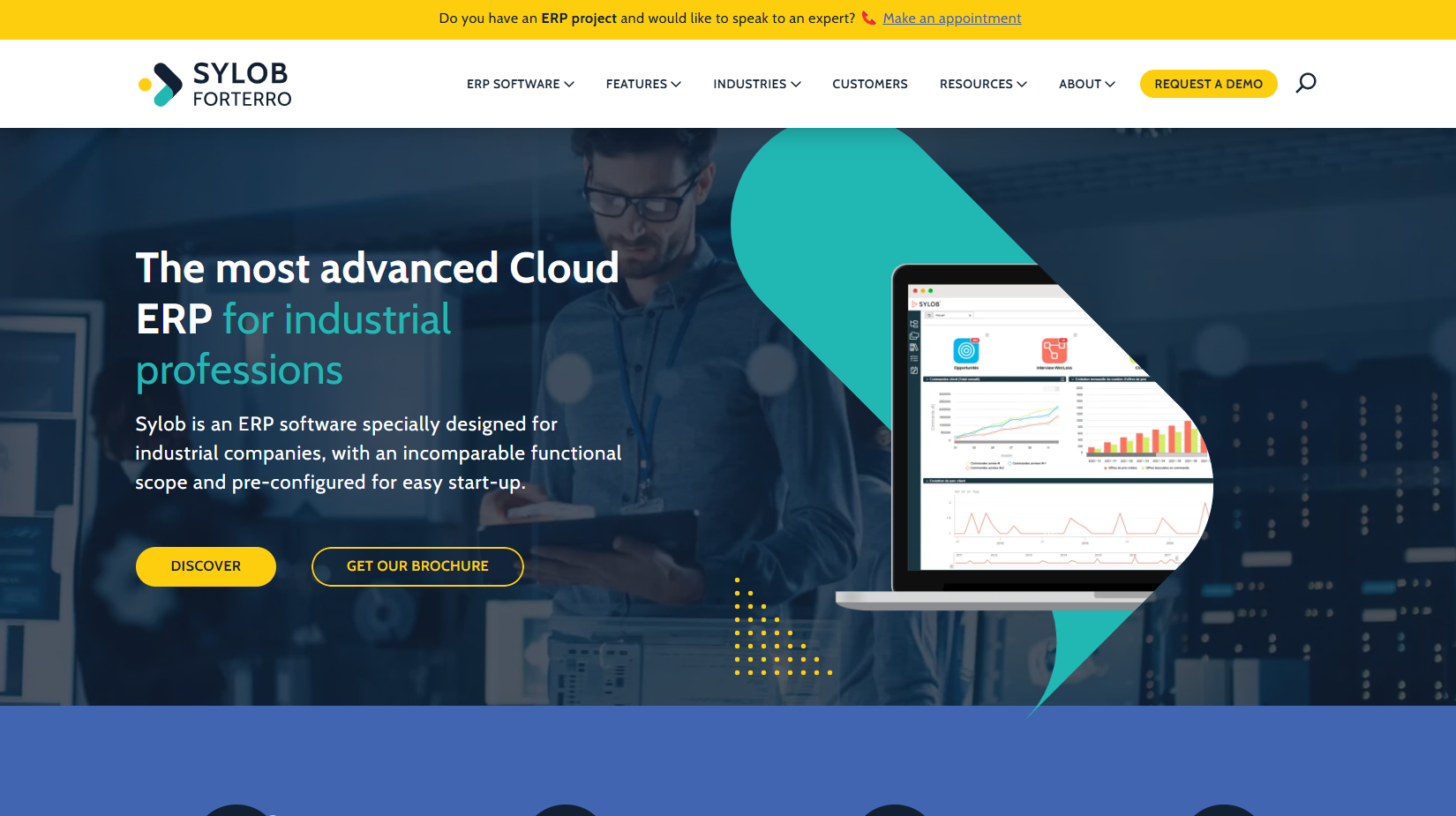
Sylob offers an ERP solution dedicated to industrial sector businesses, with specific features for inventory management, production planning, and order and delivery management. This solution is ideal for companies looking to refine their supply chain and production management.
10. Axelor
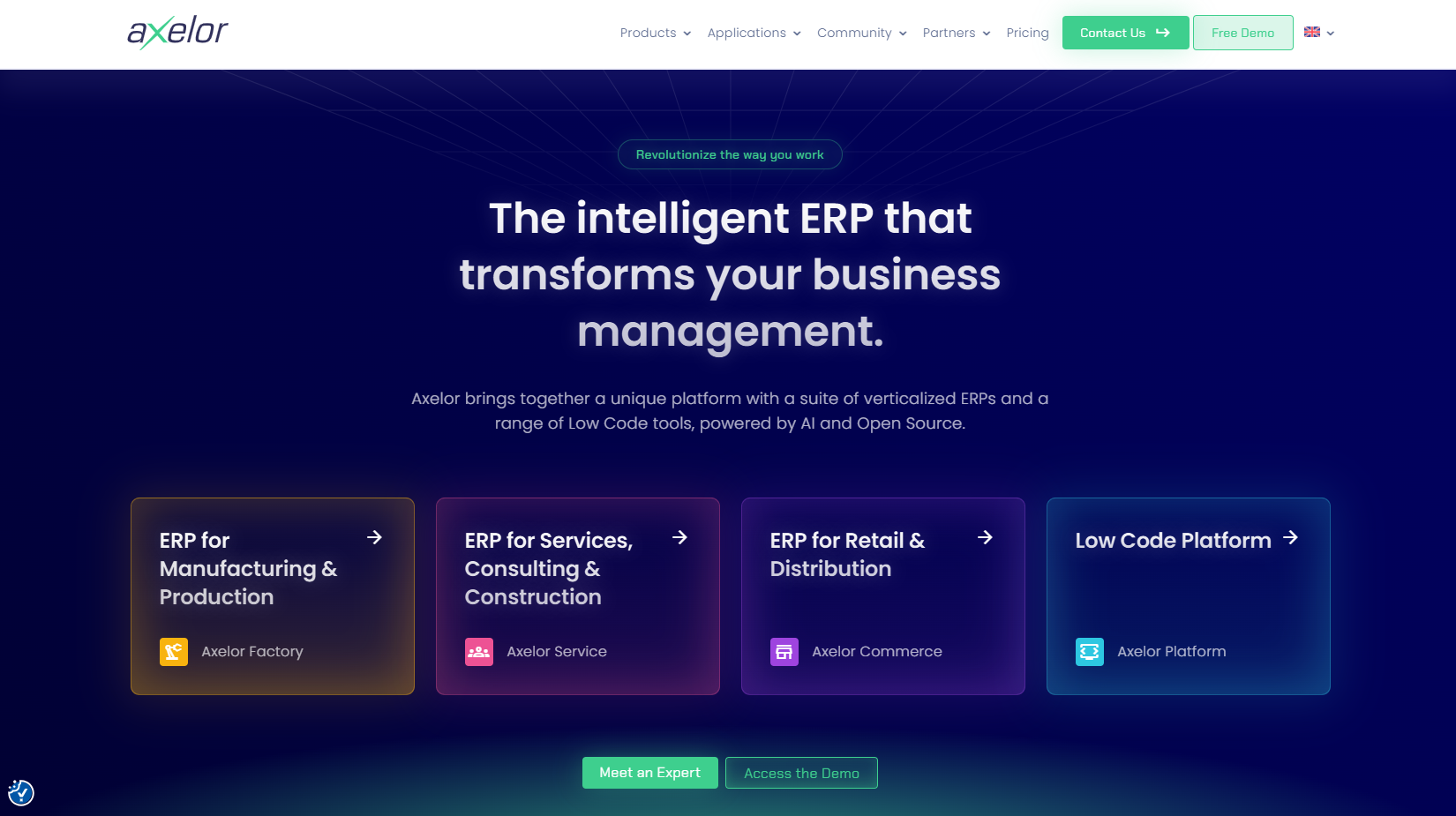
Axelor is a comprehensive open-source ERP platform equipped with a wide range of essential business management features.
This includes financial management, human resources management, inventory tracking, and project management. It stands out for its flexibility and ability to be customized, precisely meeting the unique requirements of each business.
Axelor also differentiates itself with its intuitive user interface and advanced reporting tools, making decision-making and process optimization easier.
Odoo Alternatives: Key Takeaways
The best Odoo alternative depends entirely on your company's specific needs, budget, and long-term strategic goals. The available options range from comprehensive enterprise solutions like NetSuite and SAP to flexible open-source platforms like ERPNext. It is advisable to carefully compare these options and leverage free trials or demos before making a final decision.
Ultimately, integrating advanced communication tools is essential for maximizing the efficiency of any business management software. To see how a unified communication platform can elevate your operations, get to know Ringover.
Odoo Alternatives FAQ
What is Odoo, and why look for alternatives?
Odoo is an open-source suite of ERP and CRM software. Businesses often search for alternatives due to factors like high implementation costs, operational complexity for smaller teams, and the need for more specialized functionality in areas like finance or sales.
Who are Odoo's main competitors?
Odoo's main competitors include a mix of enterprise-grade and open-source solutions:
- Oracle NetSuite
- SAP Business One
- Microsoft Dynamics 365
- ERPNext
- Sage
What are the best alternatives to Odoo for SMEs?
Several options are particularly well-suited for SMEs due to their balance of cost, ease of use, and scalability. ERPNext, Dolibarr, Zoho, and HubSpot are all strong choices that provide robust capabilities without the high expense or complexity of larger enterprise systems [7].
Citations
- [1] https://randgroup.com/insights/services/evaluation-selection/top-erps-for-midsize-companies
- [2] https://crm.org/news/best-odoo-alternatives
- [3] https://tipalti.com/resources/learn/odoo-alternatives
- [4] https://softwareconnect.com/roundups/best-small-business-erp-software
- [5] https://softwaresuggest.com/odoo/alternatives
- [6] https://softwareworld.co/competitors/erp-alternatives
- [7] https://top10erp.org/blog/erp-for-small-business
Published on January 29, 2025.



